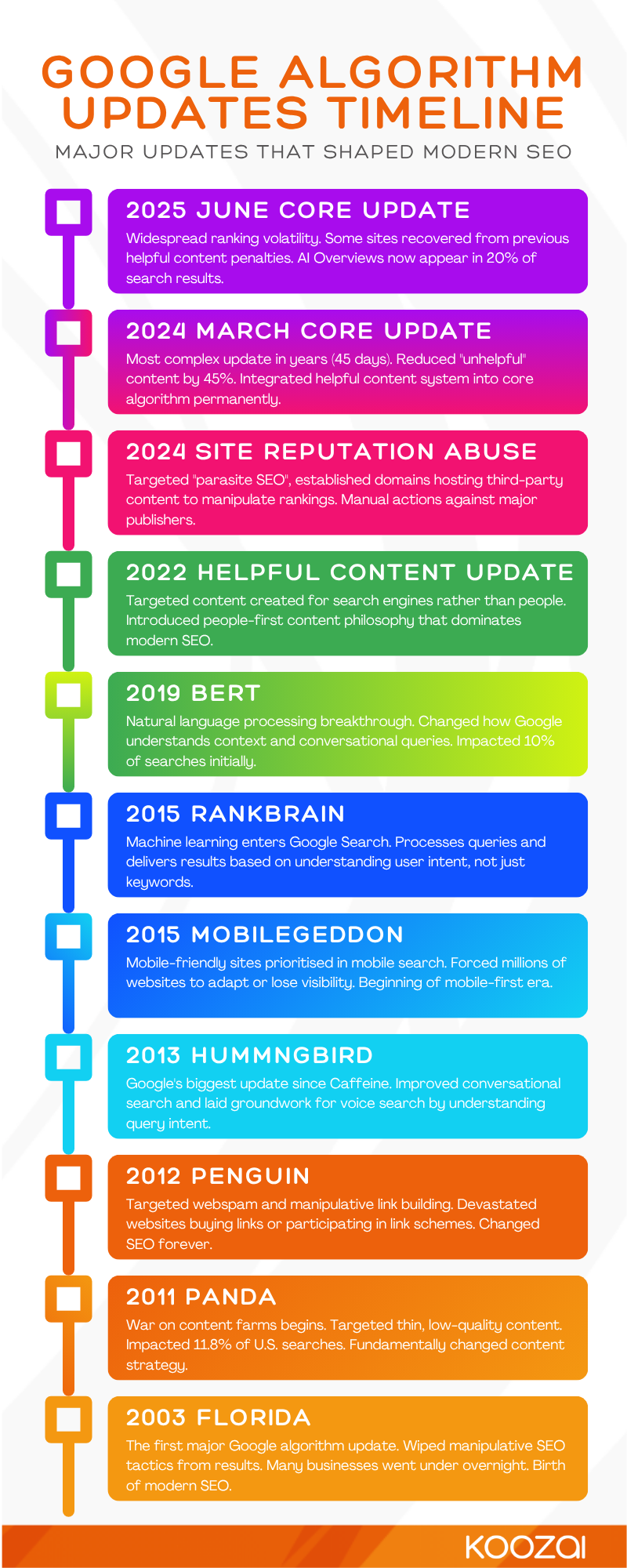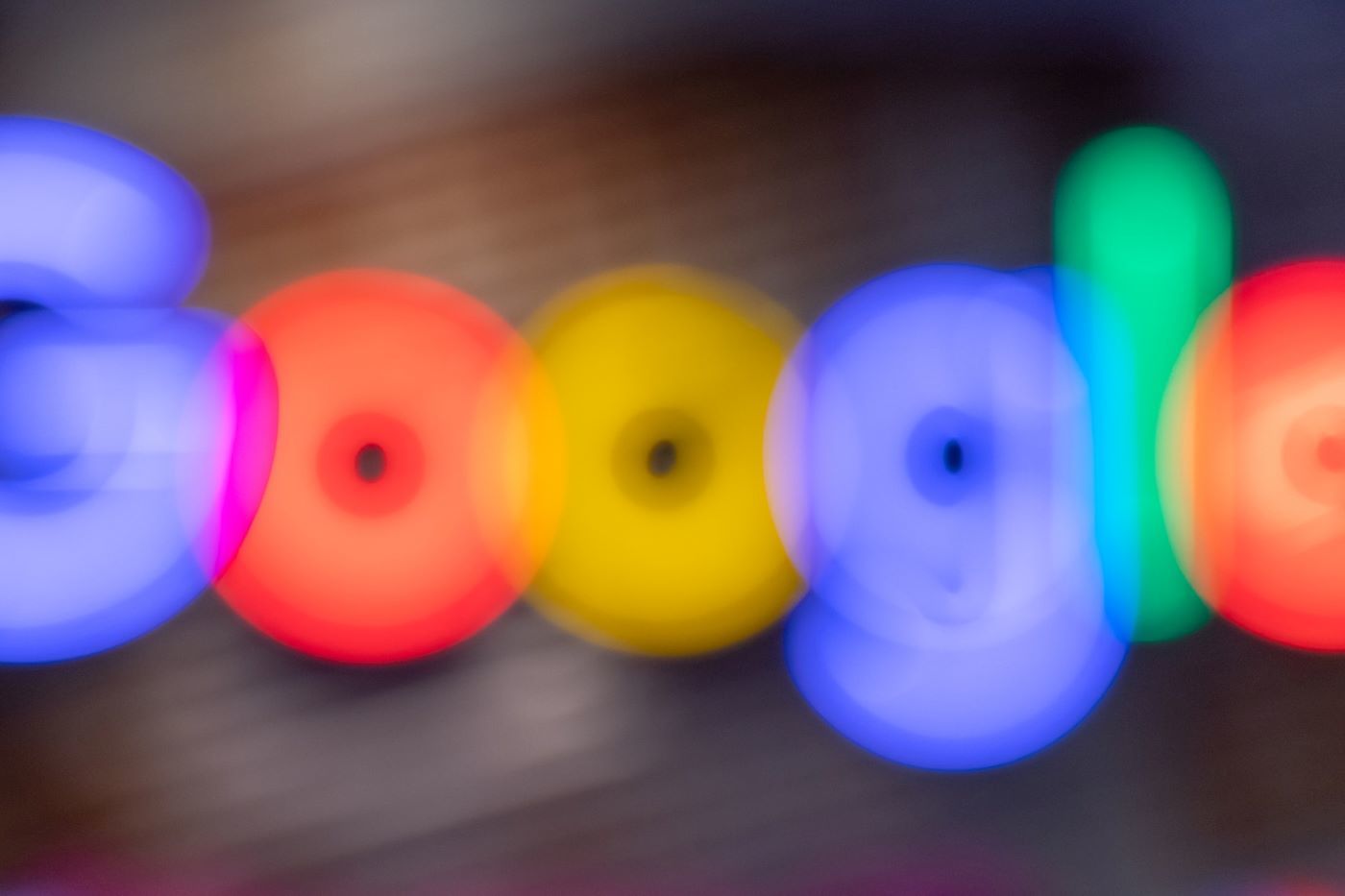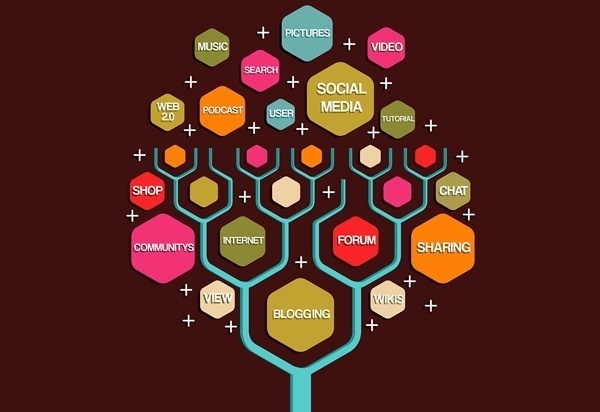The Complete Guide to Google Algorithm Updates
If you’ve ever watched your website’s traffic suddenly spike or plummet overnight, you’ve likely experienced the impact of a Google algorithm update. Understanding these changes is essential for anyone serious about maintaining and growing their online presence.
At Koozai, we’ve monitored every major algorithm shift since Google began making significant changes to how it ranks websites. This comprehensive guide draws on over two decades of algorithm change to help you understand what’s happened, what’s happening now, and how to future-proof your website.
What Are Google Algorithms?
Google’s algorithms are complex systems that retrieve data from its search index and deliver the most relevant results for any given query. Think of them as a highly sophisticated sorting mechanism that evaluates billions of webpages in milliseconds to answer your question.
The search engine considers hundreds of ranking factors, including:
- Content quality and relevance
- Page loading speed
- Mobile-friendliness
- Backlink profile
- User experience signals
- Domain authority
- Content freshness
In Google’s early years, the company made just a handful of updates annually. Today, Google implements thousands of changes every year, most so subtle they pass unnoticed. However, several times each year, Google rolls out major updates that can significantly reshape search rankings across the internet.
Understanding Google’s Update Frequency
Google is constantly changing. In 2022 alone, the company launched 4,725 changes to search. That averages out to roughly 13 changes per day. Behind the scenes, Google also ran:
- 13,280 live traffic experiments
- 894,660 search quality tests
- 148,038 side-by-side experiments
While most changes are minor refinements, the major algorithm updates tend to cause noticeable impacts on rankings, traffic, and ultimately, revenue.
The Most Important Google Algorithm Updates of 2024-2025
December 2025 Core Update
Rollout began 11 December 2025 (and is expected to take up to three weeks to complete).
This is Google’s third core update of 2025, following the March and June core updates earlier in the year.
Unlike more targeted changes (spam or niche refinements), this broad core update is part of Google’s continued effort to refine how it evaluates relevance and content quality across all types of sites, essentially the same playbook: rewarding genuinely helpful, high-quality content while reassessing signals overall.
At the time of writing, Google hasn’t shared granular details about specific ranking factors being adjusted, so the usual guidance applies: don’t chase quick fixes, focus on content that answers real user needs, demonstrates expertise and trustworthiness, and delivers value beyond surface-level information. Early chatter suggests E-E-A-T and content utility may be under closer scrutiny than in some past updates.
Key points to note:
- Start date: 11 Dec 2025
- Rollout duration: Up to 3 weeks
- Scope: Global and broad core ranking system changes
Impact:
General volatility is expected, and as with all core updates, some sites will rise, some will fall; changes are likely to be about relevance and quality signals, not specific penalties.
August 2025 Spam Update
Rollout period: August 26 – September 22, 2025
The August 2025 Spam Update focussed on enhanced detection of AI-generated content, link spam and unoriginal patterns. It rolled out globally in all languages over approximately 27 days. If your site followed legitimate SEO practices, you had little to worry about. However, websites employing manipulative tactics likely saw ranking drops.
Key Highlights
- Broad spam signal improvements using AI and machine learning
- Greater scrutiny on unoriginal and AI-pattern content
- Global rollout – affecting all regions and languages
Impact and Data
- Immediate traffic declines were reported within 24 hours of launch
- Some recoveries seen among sites impacted by earlier spam updates
- Volatility confirmed via SEO tracking tools and SERP fluctuations
“With the August 2025 spam update rolling out, one of my (newer) websites seems to have recovered from the previous spam update.” Reddit SEO thread
Actions for Site Owners
- Audit content originality and user value
- Disavow manipulative or paid link schemes
- Focus on long-term user-first content strategies
“With the August 2025 spam update rolling out, one of my (newer) websites seems to have recovered from the previous spam update.” Reddit SEO thread
June 2025 Core Update
One of the more significant recent updates, the June 2025 core update, caused widespread ranking volatility across multiple industries. There was no official announcement on the blog; it was communicated via Google Search Status Dashboard. Some websites partially recovered from previous helpful content and review update penalties, suggesting Google refined how it evaluates quality.
Rollout period: –
A broad core algorithm update focusing on improved relevance and content quality evaluations over time. Affected multiple sectors, including media and informational content.
Key Highlights
- Long-term pattern evaluations over weeks/months
- Sites previously affected by HCU saw partial recovery
- Not a penalty-based update, a reassessment of relevance
Impact and Data
- Volatility spikes detected from June 30 – July 6
- Media websites saw up to 50% visibility drop
- AI-generated content (when it meets quality standards)
- Review-driven queries
- Featured snippets and “People Also Ask” panels
- Recovery observed in some previously demoted domains
“Core updates generally build on longer-term data, so something really recent wouldn’t play a role.” John Mueller, Google Search Advocate
Actions for Site Owners
- Conduct sitewide audits for content quality and expertise
- Review past underperforming content for update opportunities
- Build long-term authority and user trust signals
What it means for you: Google is becoming more sophisticated at identifying genuinely helpful AI content while still rewarding human expertise and original insights.
March 2025 Core Update
Roll‑out period: –
The March 2025 Core Update, a global broad algorithm change by Google LLC, was described as a “regular” update with similar volatility to December 2024. It marked the first major core update of 2025 and reinforced Google’s commitment to surfacing more relevant, high‑quality content across all industries. If you want to learn more, then Google’s documentation on core updates can be found here: Google Search Central – Core Updates
Key Highlights
- Global rollout (all languages, all regions) beginning 13 March and completed around 27 March.
- Not targeted at specific sites or industries, rather a broad evaluation of relevance and quality signals.
- Tracking tools indicated volatility similar in magnitude to the December 2024 core update, though arguably slightly less widespread.
Impact & Insights
- Visibility tool SISTRIX showed significant movement beginning 16 March, with selected UK/US domains experiencing drops up to 20‑30% in visibility.
- In one example, UK domain quora.com logged a visibility drop of 22.45% between 13 March and 26 March.
- Anecdotal reports from the SEO community ranged from large gains (e.g. +200 %) in certain niche cases, to minimal change or declines in others.
Actions for Site Owners
- Review your content from the perspective of user benefit: Does it answer real questions, reflect expertise/authority, and provide genuine value rather than simply echoing others?
- Avoid expecting “quick fixes” (such as removing a few links or changing a title tag) to result in immediate recovery. Recovery often depends on sustained improvements over time.
- Use Google Search Console to explore position and impressions changes, particularly comparing the period just before rollout to the weeks following, and look for patterns in specific site sections or page types.
- Monitor and consider improving broader signals: site architecture, expertise/authority/trust indicators (E‑A‑T), mobile & page‑experience performance, and content depth. Over time, these are more likely to influence ranking changes than isolated technical tweaks.
Described as a “regular” update with similar volatility to December 2024, this 14-day rollout reinforced Google’s commitment to surfacing relevant, high-quality content. The update affected websites globally across all industries.
December 2024 Updates
December 2024 Core Update (Dec 12-18): Came just one week after November’s core update finished rolling out. Google clarified that the consecutive updates targeted different core systems, a reminder that Google constantly refines multiple aspects of its ranking algorithm simultaneously.
December 2024 Spam Update (Dec 19-26): Applied globally to combat spammy tactics across all languages.
December brought two significant changes from Google LLC: a broad core algorithm update followed immediately by a global spam‑signal update. The Core Update began on December 12 and concluded by December 18, and the Spam Update ran from December 19 to December 26. These changes reflect Google’s continued efforts to refine multiple ranking systems simultaneously.
Key Highlights
- The Core Update was announced on December 12 and completed in six days, ending December 18.
- Google noted: “The Dec. 2024 core update is rolling out … we have different core systems we’re always improving.”
- The Spam Update commenced the day after the core rollout ended (December 19) and concluded December 26.
- This pair of updates signalled that Google was refining different core systems simultaneously (core and spam) rather than just one single system.
Impact & Insights
- Tracking‑tools showed elevated volatility for the Core Update: average position changes around 2.8 positions vs ~2.4 in November.
- The Spam Update caused significant turbulence, described as “the biggest spam update … for quite some time” by industry observers.
- Because the spam update followed immediately after the core update, some sites found it difficult to isolate which update had affected them.
- The global rollout across industries meant no sector was completely immune; however, the overall impact was reported as “more impactful than November but less volatile than the August and March updates” (analyst commentary).
“If you’re wondering why there’s a core update this month after one last month, we have different core systems we’re always improving.” Google Search Central announcement via X.
Actions for Site Owners
- Perform a comprehensive content audit: focus on helpfulness, originality, and audience‑value (core) *and* review for spam‑policy violations (spam update).
- Monitor performance using tools such as Google Search Console and third‑party visibility trackers around late December and early January.
- Understand that recovery from these updates is not immediate; many sites impacted by spam or core delays in seeing improvements should adopt a long‑term quality‑first strategy.
Timeline of Google Algorithm Updates

The Evolution of Spam Fighting: Site Reputation Abuse
In November 2024, Google updated its site reputation abuse policy to combat “parasite SEO”, a tactic where established domains publish third-party content primarily to manipulate rankings.
Common examples include:
- Educational websites publishing payday loan reviews
- News sites hosting unrelated affiliate content
- Trusted domains selling their authority through guest posts designed solely for ranking
While Google currently handles enforcement manually, the company plans to introduce algorithmic detection in the future. Major publishers felt the impact of this policy shift, with many seeing significant ranking adjustments.
Best practice: If you host third-party content, ensure it aligns with your site’s purpose and maintains the same quality standards as your owned content.
The 2024 Game-Changer: AI Content and Helpful Content Integration
August 2024 Core Update
This update marked a turning point in how Google handled the explosion of AI-generated content. Taking feedback from the September 2023 helpful content update, which harshly penalised many small and independent publishers, Google refined its approach.
Some sites hit by previous helpful content updates saw improvements, though few experienced full recovery. The message was clear: Google wants content that genuinely helps users, regardless of how it’s created.
March 2024: The Biggest Update in Years
Rolling out over an unprecedented 45 days, the March 2024 update represented Google’s most complex algorithm change in recent memory. Multiple core systems received updates simultaneously, resulting in substantial ranking fluctuations.
Google claimed to reduce “unhelpful” content by 45%, a staggering achievement if accurate. The update introduced three new spam classifications:
1. Scaled Content Abuse: Producing content at scale (whether through AI, humans, or both) primarily to boost rankings
2. Expired Domain Abuse: Purchasing expired domains to repurpose them with low-quality content
3. Site Reputation Abuse: Using established domains to host third-party content designed to manipulate rankings
Perhaps most significantly, Google incorporated its helpful content system into the overall core ranking system, making it a permanent fixture rather than a separate signal.
Historical Perspective: Updates That Shaped Modern SEO
Panda (2011): The War on Content Farms
Launched in February 2011, Panda targeted “content farms”, websites that produced thin, low-quality content designed to rank for keywords while offering little actual value. This update affected 11.8% of U.S. search results and fundamentally changed how publishers approached content creation.
The lesson: Quality and depth matter more than quantity.
Penguin (2012-2016): Link Schemes Meet Their Match
The original Penguin update in April 2012 targeted webspam, particularly websites buying links or participating in link schemes. When Penguin 4.0 rolled out in September 2016, Google made it part of the core algorithm and shifted to real-time updates.
Rather than penalising entire websites for bad links, Penguin became more granular, potentially impacting individual pages or sections of a site.
The lesson: Build links through genuine relationships and valuable content, not manipulation.
Hummingbird (2013): Understanding Intent
Hummingbird represented Google’s biggest algorithmic leap since Caffeine in June 2010. It improved conversational search and laid the groundwork for voice search by helping Google understand the intent behind queries, not just the keywords.
The lesson: Optimise for topics and user intent, not just individual keywords.
Mobilegeddon (2015): The Mobile-First Era Begins
The Mobile-Friendly Update of April 2015 sent shockwaves through the SEO community. Google began prioritising mobile-friendly websites in mobile search results, forcing businesses to adapt or lose visibility.
The lesson: User experience across all devices is non-negotiable.
RankBrain (2015): Machine Learning Enters the Picture
Powered by machine learning, RankBrain processes search queries and sorts through billions of webpages to rank the most relevant results. Initially used on a large fraction of searches, it eventually powered all Google queries.
The lesson: Google is constantly getting better at understanding what users really want.
BERT (2019): Natural Language Processing
The Bidirectional Encoder Representations from Transformers update, mercifully shortened to BERT, changed how Google interprets queries by considering how each word relates to all other words in a sequence. This made Google far better at understanding complex, conversational queries.
The lesson: Write naturally for humans, not search engines.
Helpful Content Update (2022): People-First Content Wins
First rolled out in August 2022, this update specifically targeted content created primarily for search engines rather than people. Sites with large amounts of content that offered little unique value saw dramatic traffic losses.
The September 2023 update refined the helpful content system with an improved classifier, and the December 2022 update added new signals while expanding to all languages.
The lesson: Ask yourself “Would someone find this genuinely helpful?” before publishing.
How to Respond to Algorithm Updates: A Practical Framework
Before Updates Hit
1. Build on Solid Foundations
Focus on creating comprehensive, accurate, and genuinely helpful content. Google’s guidance consistently emphasises content quality over any specific optimisation technique.
2. Demonstrate E-E-A-T
E-E-A-T stands for Experience, Expertise, Authoritativeness, and Trustworthiness. Demonstrate these qualities by:
- Showcasing author credentials and expertise
- Citing authoritative sources
- Maintaining factual accuracy
- Building a reputation through genuine backlinks
- Displaying clear contact information and privacy policies
- Sharing first-hand experience and original insights
3. Prioritise User Experience
Ensure your website loads quickly, works flawlessly on mobile devices, and provides a smooth, intuitive experience. Poor user experience signals can undermine even the best content.
4. Stay Technically Sound
Maintain proper site structure, implement structured data where appropriate, fix broken links promptly, and ensure search engines can easily crawl and index your content.
When Updates Roll Out
1. Don’t Panic or Make Hasty Changes
Algorithm updates typically take one to two weeks to fully roll out (though some take longer). Rankings often fluctuate during this period before stabilising. Avoid making dramatic changes based on day-one results.
2. Monitor Multiple Metrics
Track:
- Organic traffic by landing page
- Rankings for key terms
- Click-through rates
- Conversion rates
- Time on page and bounce rates
Look for patterns across pages rather than focusing on individual ranking losses.
3. Identify What Changed
If you experience significant drops, analyse:
- Which pages were affected most?
- What do those pages have in common?
- Did competitors gain positions you lost?
- What are they doing differently?
After Updates Settle
1. Audit Affected Content
For pages that lost visibility, assess:
- Is the content comprehensive and accurate?
- Does it demonstrate E-E-A-T?
- Is it genuinely helpful, or does it exist primarily for rankings?
- How does it compare to top-ranking competitors?
2. Improve, Don’t Just Optimise
Rather than tweaking meta tags or keyword density, focus on making your content substantively better:
- Add unique insights or data
- Include expert perspectives
- Improve clarity and readability
- Add helpful visuals or examples
- Update outdated information
3. Be Patient
Recovery from algorithm updates often takes time, sometimes several months. Google needs to recrawl your pages and reassess your entire site. Consistent improvements compound over time.
The Current State: What Google Prioritises in 2025
Based on recent updates, Google’s priorities are clear:
1. Genuinely Helpful Content
Content should answer user questions thoroughly and accurately. It should be created for people first, with search engines as a secondary consideration.
2. Original Insights and First-Hand Experience
Google increasingly values content that demonstrates actual experience with products, services, or topics. Generic, rehashed information struggles to rank.
3. Demonstrated Expertise
Whether through author credentials, cited sources, or depth of knowledge, demonstrate why readers should trust your information.
4. Technical Excellence
Fast-loading, mobile-friendly, secure websites with clean technical foundations get preference over technically flawed competitors, assuming content quality is equal.
5. Authentic Link Profiles
Earn links through valuable content and genuine relationships, not through schemes, purchases, or manipulation.
6. Appropriate Use of AI
Google doesn’t penalise AI-generated content per se, but it must meet the same quality standards as human-written content. AI should augment human expertise, not replace it entirely.
Future-Proofing Your SEO Strategy
While predicting specific algorithm updates is impossible, you can future-proof your approach:
Focus on Fundamentals
Build your strategy on timeless principles:
- Create genuinely helpful content
- Demonstrate expertise and trustworthiness
- Provide excellent user experiences
- Earn authority through quality and reputation
These fundamentals have survived every algorithm update and will continue to matter.
Stay Informed but Not Obsessed
Monitor industry news and Google’s official announcements, but don’t let every rumored update derail your strategy. Dramatic changes based on speculation often do more harm than good.
Think Long-Term
SEO is a marathon, not a sprint. Sustainable growth comes from consistently publishing quality content, building genuine authority, and earning trust, not from exploiting loopholes or chasing quick wins.
Embrace Change
Google’s algorithm will continue evolving. Technologies like AI, changes in user behavior, and new types of content will drive future updates. Stay flexible and willing to adapt.
Common Misconceptions About Algorithm Updates
Myth 1: “My Rankings Dropped, So Google Penalised Me”
Most ranking drops aren’t penalties, they’re the result of other pages becoming more competitive or Google refining what it considers most relevant. True penalties are relatively rare and usually target manipulative practices.
Myth 2: “I Need to Fix Something Immediately”
Unless you’re genuinely violating Google’s guidelines, ranking drops after updates don’t necessarily mean something is “broken.” Your content might be fine, competitors might have simply improved theirs.
Myth 3: “AI Content Will Get Me Penalised”
Google has explicitly stated it doesn’t penalise AI-generated content. The content must be helpful, accurate, and demonstrate E-E-A-T, but the tool used to create it isn’t inherently problematic.
Myth 4: “Algorithm Updates Only Affect Certain Industries”
While some updates target specific practices (like product reviews), broad core updates can affect any website in any industry. Quality and relevance matter everywhere.
Summary
Google’s search algorithm will never stop. The company makes thousands of changes annually, with major updates several times per year. This reality can feel overwhelming, but it also creates opportunity. Websites built on solid foundations, focussed on genuinely helping users, and committed to demonstrating expertise and trustworthiness consistently, weather algorithm updates better than those chasing shortcuts.
At Koozai, we’ve guided clients through every major algorithm update since 2003. The core lesson remains unchanged: focus on creating exceptional experiences for real people, and the rankings will follow. It’s not about gaming the system, it’s about deserving the rankings you earn.
Stay informed, stay flexible, and above all, stay focused on your users. That’s the strategy that survives every algorithm update Google throws your way.
Resources for Staying Updated
- Google Search Central Blog: Google’s official announcements about algorithm updates
- Google Search Status Dashboard: Real-time information about ongoing rollouts
- Google’s Search Quality Rater Guidelines: Insight into how Google evaluates content quality
- Industry publications: Stay current with analysis from trusted SEO news sources
Remember, algorithm updates aren’t obstacles to overcome; they’re Google’s attempt to better serve searchers. When your interests align with Google’s (helping users find what they need), updates become opportunities rather than threats.

This guide is regularly updated as new algorithm changes roll out. Last updated: 12 December 2025.







Leave a Reply